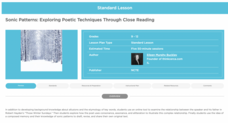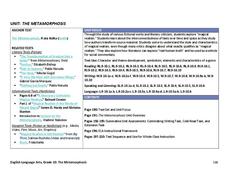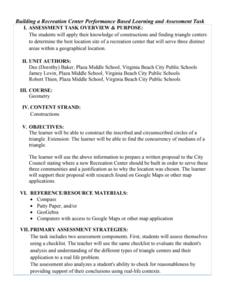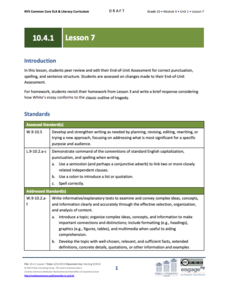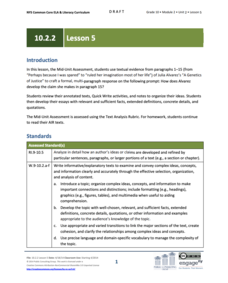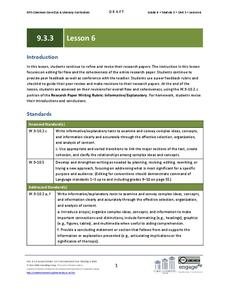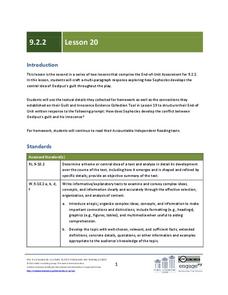ReadWriteThink
Sonic Patterns: Exploring Poetic Techniques Through Close Reading
Robert Hayden's poem "Those Winter Sundays" serves as the anchor text in a five-part lesson that takes the mystery out of poetry analysis by modeling explicit strategies for pupils to employ to conduct a close reading of a poem. After...
Orange Public Schools
Stagecraft
The house lights dim, the curtain parts, lights slowly come up, revealing the stage. Before the actors appear, before a word is spoken, the audience is drawn in by the lighting, by the colors, by lines of the set, by the props, and...
Louisiana Department of Education
The Metamorphosis
How can something be true even if it didn't happen? Invite your classes to investigate the truths found in the world of magical realism as they analyze short stories, poems, informational texts, video, and art from this genre.
Common Sense Media
My Online Code
Approach ethical online behavior with a series of activities geared toward teaching pupils about digital citizenship. After a brief discussion about ethics, small groups inspect a fictional social networking profile with ethics in mind....
Curated OER
Creative God or Goddess
Who causes sinkholes? Or acid rain? High schoolers try their hand at myth-making as individuals create a god or goddess responsible for the modern-day phenomenon. They introduce their deity in an essay that reveals the name, parentage,...
ReadWriteThink
Heroes Are Made of This: Studying the Character of Heroes
What makes heroes and villains? A six-part unit plan asks young scholars to explore the concept of heroism and the characteristics they consider heroic and unheroic. Groups create character maps that focus on how characters are shaped by...
National Park Service
Lesson 6: Researching Contemporary Slavery
While many believe slavery ended after the American Civil War, it continues today in various forms. Using a WebQuest research project, class members investigate how the institution of slavery lives on in the modern world. Activities also...
Radford University
Building a Recreation Center
It's all about location, location, location. Small groups work to find the best spot for a rec center to serve three different communities. Learners construct the inscribed and circumscribed circles of a triangle to find the best place....
EngageNY
Grade 10 ELA Module 4: Unit 2, Lesson 8
Shakespeare's Macbeth has something for everyone. Scholars complete a mid-unit assessment. They craft multi-paragraph essays to analyze how the author's structural choices create tension and suspense in the play's first two acts.
EngageNY
Grade 10 ELA Module 4: Unit 1, Lesson 7
High school writers participate in peer review of their end-of-unit tasks. They begin by discussing their thought process in pairs and then editing their work. Finally, learners participate in a class discussion on the use of the...
EngageNY
Grade 10 ELA Module 4: Unit 1, Lesson 6
It's time to tie it all together. Scholars reflect on the series' past five lessons about Death of the Pig. They examine how E.B. White develops a central idea throughout the essay before responding to a writing prompt.
EngageNY
Grade 10 ELA Module 4: Unit 1, Lesson 5
Learners prepare for the end-of-unit task by evaluating previous homework and writing sentences with parallel structure and various phrases. Scholars do this by closely examining E.B. White's Death of a Pig. They examine the structure of...
EngageNY
Grade 10 ELA Module 2: Unit 3, Lesson 7
It's time to show what you know. The final activity asks scholars to reflect on the seven-lesson plan unit and complete an end-of-unit task. Readers consider the claims presented in speeches by Eleanor Roosevelt and Malala Yousafzai...
EngageNY
Grade 10 ELA Module 2: Unit 2, Lesson 10
All good things must come to an end! Scholars put all their learning into practice by completing an end-of-unit assessment. They use textual evidence from Julia Alvarez's "A Genetics of Justice" to write essays analyzing how Alvarez...
EngageNY
Grade 10 ELA Module 2: Unit 2, Lesson 5
How do learners use textual evidence from a close reading to write a well-developed essay? Scholars try it by completing a mid-unit assessment based on their analysis of the first 15 paragraphs from "A Genetics of Justice" by Julia...
EngageNY
Grade 10 ELA Module 2: Unit 1, Lesson 20
Readers take all the information they gained from the last 19 lessons and complete an essay describing how King develops his purpose and claim in "Letter from Birmingham Jail." Pupils use a rubric and checklist to help guide their...
EngageNY
Grade 10 ELA Module 2: Unit 1, Lesson 10
Scholars review the previous nine lessons of analysis of King's "Letter from Birmingham Jail" and use their work to create a formal essay responding to a writing prompt about the purpose of the work. This mid-unit assessment is a quick...
Fabius-Pompey School District
Paired Passage Practice and the Extended Response Question
How do pupils relate paired passages to each other? Here's a resource that helps! The lesson includes a short story and a poem as a set of paired reading passages, followed by some analysis questions. It also includes an essay template...
ReadWriteThink
Analyzing Famous Speeches as Arguments
A speaker, a message, an audience. After analyzing these elements in Queen Elizabeth's speech to the troops at Tilbury, groups analyze how other speakers use an awareness of events, and their audience to craft their arguments....
Trinity University
Explain Yourself: An Expository Writing Unit for High School
Introduce expository writing with a unit that asks writers to craft an essay to explain a belief, value, or priority that is important to them. Mini-lessons within the unit focus on crafting thesis statements and conclusions, selecting...
EngageNY
Grade 9 ELA Module 3, Unit 3, Lesson 8
Writers complete editing and polishing the final draft of their research paper and submit the document for assessment.
EngageNY
Grade 9 ELA Module 3, Unit 3, Lesson 6
The eighth lesson in the editing process focuses on flow and cohesiveness in the entire research paper. Class members examine color-coded pre- and post-revision model paragraphs and then work in pairs to revise and peer-review their papers.
EngageNY
Grade 9 ELA Module 3, Unit 3, Lesson 4
The fourth activity in a unit on crafting a research paper focuses on cohesion within and between paragraphs. Class members examine models that lack cohesion and ones that are cohesive and logically developed before using what they have...
EngageNY
Grade 9 ELA Module 2, Unit 2, Lesson 20
Oedipus' lack of literal and figurative vision does not mean he cannot see his guilt in the terrible fates of Laius, Jocasta, and all the lives touched by prophecy. Conclude a literary analysis unit on Sophocles' Oedipus the King with a...


